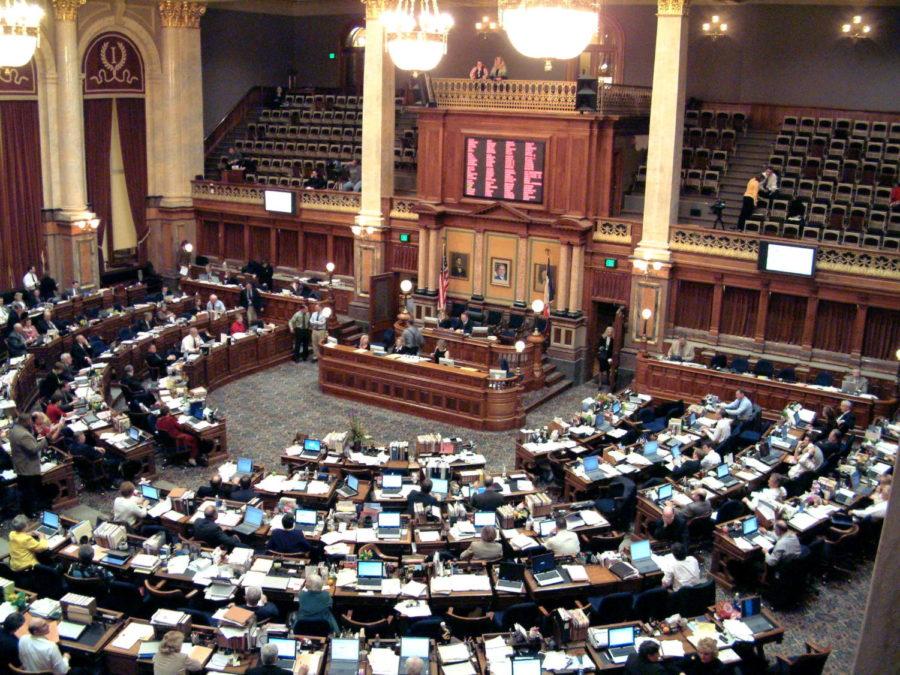Wright: Iowa preemption bill under the radar
The Iowa 2018 legislative session begins Monday, Jan. 8. A main focus for Ames legislators will be funding for state universities as well as K-12 schools.
March 18, 2017
In my last column, I addressed a proposed bill in the Iowa Legislature, House Study Bill 92. The primary concern of the bill is the overruling of any and all local minimum wage ordinances at the city and county level.
Currently, four counties have passed bills raising minimum wage to varying levels. Many of Iowa’s local news outlets have focused on the wage aspect of this bill, but the bill itself also includes provisions regarding topics with little relevance to wage laws, such as “containers” and certain local civil rights.
These last points are less momentous than legislation concerning minimum wage, seeing as most laws in Iowa regarding discrimination and workers’ rights are at the state and federal levels. Nonetheless, opponents of the bill have reacted with confusion and worry over such peculiar legislation.
In response to these criticisms, the bill was amended late last month. Instead of removing all local discrimination laws, it will focus on removing local laws concerning housing discrimination.
The most well-known case where this law has negative repercussions is in Marion, Iowa, where a local law prevents landlords from discriminating against renters based on how they receive money; whether it be from a job, pension or disability payment.
Renters claim that these restrictions prevent them from making financially sound decisions as to who they should provide leases to. On the other side of this debate, veterans’ rights groups have countered that such discrimination goes too far and that economic decisions cannot infringe on basic needs such as housing.
Republicans lawmakers, however, have taken a more palatable approach. The main argument from officials supporting the bill, such as John Landon of Ankeny, is that the existence of these laws on the local level makes such policies risky and unchecked — without the uniform control of state legislature.
Therefore, two important points need to be drawn — what real causes for concern there are over the elimination of local civil rights, and how this bill fits into a national movement that isn’t receiving as much attention as it should.
Iowa is far from the only state where Republican lawmakers are trying to stop local governments from exceeding regulations put in place by the state, with preemption bills cropping up in Arizona, Oklahoma, Missouri, Alabama and 15 other states. Iowa is merely the latest state to join this multi-year movement.
And it’s in these other states that one can see reflections of HS 92. Four years ago in Wisconsin, state laws struck down legislation that had been passed in Madison protecting low-income renters. Plastic bag laws, like those soon to be struck down here in Iowa, are under similar attack in other states.
While the laws being struck down are generally regional, they also are typically popular with constituents, such as a Cleveland law recently nullified that required businesses to hire locally.
Republican lawmakers are not doing this to appeal to their constituents. In many states, they actually result from businesses contributing to Republican campaigns — in Wisconsin, the American Chemistry Council, which profits greatly from American dependence on plastic bags, was a primary contributor to many Republican lawmakers who supported the bill. The National Federation of Independent Business, which is largely funded by the Koch brothers, has also been known to fund campaigns where states are voting on preemption bills.
A major reason lawmakers are so quick to follow the desires of lobbyists is that these movements are being largely kept under the radar. Now, more than ever, national attention is primarily focused on the federal government and not on local changes. If people can realize how these local shifts are part of an equally powerful force, maybe attention can be shifted. If this happens, states have a real chance at making lawmakers accountable again.







